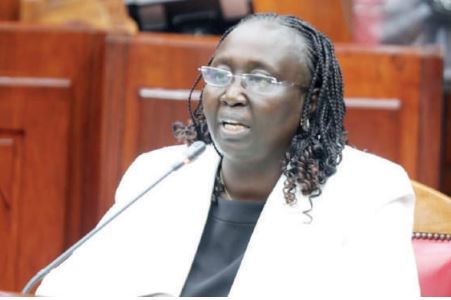

The government has launched a sweeping reform agenda to curb the increasing cases of gender-based violence that have plagued the country in recent months.
Gender Cabinet Secretary Hannah Cheptumo announced that the state is implementing "significant systemic reforms" aimed at drastically reducing GBV incidents.
These reforms span legal, judicial and institutional frameworks.
Between August and October last year alone, 97 women were murdered in cases linked to GBV.
“These efforts aim to address systemic challenges and ensure justice for survivors,” Cheptumo said while appearing before the Senate plenary on Wednesday.
Key components of the reforms include the establishment of dedicated GBV courts, the development of a Gender Information Management System (GIMS) and the creation of a specialised unit within the Office of the Director of Public Prosecutions.
Her ministry, in collaboration with the National Gender and Equality Commission, is developing the GiMS, which she described as transformative in the fight against GBV.
“GIMS is a critical tool for advancing gender equality and tackling GBV and related issues in Kenya,” she said.
The system will serve as a centralised platform for collecting, storing, analysing and disseminating gender-related data from both national and county levels.
This will eliminate data fragmentation and enhance coordination in decision-making and programme development tailored to the needs of women, men, boys, and girls.
Furthermore, GIMS will support the monitoring and evaluation of national, regional and international commitments such as the constitution, Vision 2030 and the Sustainable Development Goals (SDGs).
The government has also set up safe shelters, psychological support services and aid mechanisms for GBV survivors across several counties.
Additionally, a Presidential Working Group on Femicide has been formed and Standard Operating Procedures for GBV case handling have been introduced.
The government is also pushing for strengthening the existing legislation through various amendments to curb the vice.
“The manual outlines proper procedures for reporting, meticulous evidence recording and effective prosecution, aiming to ensure victims receive prompt and effective justice,” Cheptumo explained.
She noted that GBV is driven by a complex mix of social, economic, cultural, legal and institutional factors, requiring a coordinated, multi-agency response.
These include patriarchal norms, gender inequality, harmful traditional practices, poverty, unemployment, weak law enforcement, inadequate protection mechanisms and a slow justice system.
To accelerate justice for victims, the government has established 11 specialised GBV courts across the country, located in Siaya, Mombasa Kiambu, Meru, Nakuru, Machakos, Kisii, Kibera, Kitale and Makadara.
In addition, 97 protection centers—also known as safe shelters — have been set up across 21 counties to provide refuge and essential services to GBV survivors.
“These shelters play a vital role in ensuring safety and providing services such as physical care, vocational training, business start-up support, financial assistance, and reintegration into society,” Cheptumo noted.
The government’s shelter initiative is part of a broader multi-agency approach. This includes the one-stop GBV recovery centres established in all Level 5 hospitals across Kenya’s 47 counties.
The ministry has developed guidelines for the establishment and management of these centres, opening the door for private sector involvement to support and supplement government efforts.
Currently, the ministry is advocating for amendments to the Protection Against Domestic Violence Act to formally recognise and regulate GBV protection shelters and SOPs.
“My ministry should be considered for increased funding to establish model GBV protection centres and operationalise existing ones,” Cheptumo urged.
INSTANT ANALYSIS
Last year, government Spokesperson Isaac Mwaura revealed that 97 women were tragically killed in femicide cases over just 90 days.
Mwaura said another 150 women lost their lives to femicide in 2023. Most of these femicide cases were linked to Gender-Based Violence (GBV). The police said they were investigating the cases to bring the perpetrators to book.













